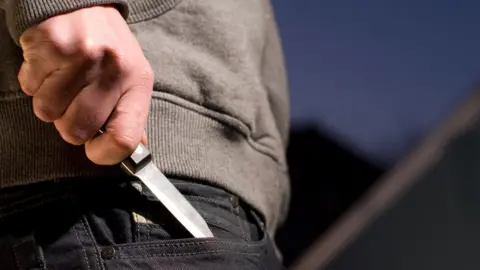Largest crime rise in England and Wales for 10 years
 Getty Images
Getty ImagesCrime in England and Wales has seen its largest annual rise in a decade, according to the Office for National Statistics.
The total number of crimes reported to and recorded by the police rose by 10% between April 2016 and March 2017 to almost five million.
Violent crime was up by 18%, robbery by 16% and sex offences by 14%.
The figures come as Home Office data shows the number of police officers is the lowest since 1985.
A report said there were 123,142 officers across all ranks in England and Wales at the end of March this year.
Despite the rise in crime recorded by police, the Crime Survey of England and Wales, based on people's experiences of crime, showed a 7% drop.
The Crime Survey is always published on the same day as the ONS figures.
Its results are based on a face-to-face survey of 38,000 adults and children in which they are asked about their experiences of crime in the previous year.
The method means it includes crimes that are never reported to the police.
'High harm offences'
In the ONS statistics, nearly five million crimes were recorded by the police in the last year - 458,021 more than the previous year.
The number of offences of violence against a person went up 18% to 175,060 offences.
Theft was up 7%, with 118,774 crimes recorded, and public order offences rose 39% to 78,697.
There were 723 homicides in the past year - made up of murders, manslaughter and infanticide cases.
The figure included the 96 Hillsborough deaths for the first time, following the inquest verdict in April 2016 that the victims had been unlawfully killed 27 years earlier.
Even without this number, there was still a 9% rise in homicide.
There was also a 23% increase in firearms offences - equalling a further 1,200 crimes - and a 20% increase in knife crime - meaning 5,800 more offences.
John Flatley from the ONS said some of the big increases in its figures could be explained by changes in how the police recorded crime, but this was only in some categories.
He added: "Some of the increases recorded by the police are in the low volume, but high harm - offences such as homicide and knife crime that the Crime Survey is not designed to measure.
"If the increases in burglary and vehicle theft recorded by the police continue, we would expect these to show up in the [Crime Survey] survey in due course."

Analysis: Which crime figure to trust?
By Danny Shaw, BBC News home affairs correspondent
We are now seeing the first sustained and genuine increase in crime since police overhauled their recording practices 15 years ago.
The figures paint a picture of rising levels of the most serious violence, as well as crimes involving weapons.
For example, cases of murder and manslaughter, which are not prone to changes in recording methods, have been rising year-on-year since 2014.
Police are even reporting a spike in "traditional" crimes, such as burglary and car theft. They had been in long-term decline for around 20 years.
The Crime Survey continues to show a reduction. But it's increasingly clear that the survey, with a relatively limited sample, is not good at gauging emerging crime trends and offences which are small in number but great in impact, such as knife crime and robbery.
For now, the police statistics are a more useful guide as to what's really going on.

Nick Hurd, minister for policing and the fire service, said the links between police numbers and crime "are not as clear as people think".
But he said the government is listening to police concerns over funding.
"What we hear very clearly from the police at all levels is a message 'look we feel very stretched, we feel very strained at the moment'," he said.
"We cannot, as a government, be deaf to that."
Mr Hurd said although the rise in the ONS figures was partly because of "better recording by forces", the fact that "some of the increases may be genuine" means that "clearly there is more we must do to tackle the violent crimes which blight communities".
He outlined the latest government action, which includes:
- An urgent plan to tackle the rise of acid attacks
- A proposal to strengthen the laws on knife crime
- A Domestic Violence and Abuse Bill, which aims to provide victims with both support and justice, backed by £100m of funding
Rachel Almeida, head of policy at charity Victim Support, said the rise, especially in violent crime, was a "great cause for concern".
"These types of crime in particular can cause deep emotional, physical and psychological effects on victims," she said.
The Police Federation said the force was "struggling to keep pace".
Steve White, chair of the Police Federation of England and Wales, said: "What more of a wake-up call does the government need?
"Government need to start to invest now in backing the police service so that it can carry out its primary responsibility, which is the safety and security of citizens.
"These figures demonstrate that this has not happened."
